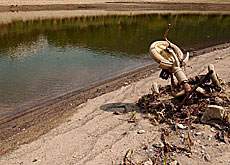Hot weather brings smiles and a few tears

The hot summer spell has brought smiles to many Swiss faces, but these conditions are causing headaches for others.
The heat has come on the tail end of the driest six-month period ever recorded in Switzerland.
The first half of the year saw little in the way of rainfall across much of the country. Record lows were registered in towns such as Zermatt, Delémont, Fribourg, and Bellinzona.
The last time so little rain fell was in 1976, when most of Europe suffered from drought conditions.
However, water restrictions are still some way off, though some towns and villages are recommending that users limit their consumption.
Farmers worried
Switzerland’s farmers have been hit hard by the lack of rain. Milk producers have seen their haystacks shrink in the heat, forcing them to buy in extra supplies.
Milk production is also down because of the heat.
Some vegetable crops are wilting badly: potatoes, tobacco, sugar beets and corn all need more water and are therefore smaller than usual.
Lettuce lovers on the other hand have plenty to smile about. The Swiss market has been saturated by local production which is up a third, forcing down prices.
Winegrowers are licking their lips at the prospect of a fine vintage. “I think we can say this year’s crop will be excellent,” said Matteo Bernasconi, a winegrowing adviser from canton Ticino.
The lack of rain means that the grapes are small and that they have avoided attack by mould.
Still, some rain would be welcome. “We wouldn’t want the dry weather to last too long,” Bernasconi told swissinfo.
Relief for resorts
The heatwave has provided some welcome relief for Switzerland’s troubled tourism industry. The worldwide recession, the war in Iraq and the Sars epidemic had led to a downturn in travel.
“People are spontaneously taking short weekend breaks and heading to the mountains,” said Silvia Devito of Switzerland Tourism.
The hot spell is also proving a draw for foreign tourists. “Our call centres have noticed that foreign tourists have seen the conditions here and are booking mountain holidays,” Devito told swissinfo.
But the weather-driven boom is unlikely to compensate for last winter’s lower figures.
“Swiss guests are helping make up the shortfall, but visitors from Japan and Asia, as well as the United States, are still missing,” she said.
Energy costs
The heatwave has also had repercussions for the energy market. Petrol and electricity wholesale prices have headed upwards.
Oil companies have increased prices because of increased shipping costs. Most of Switzerland’s petrol transits along the Rhine, which has seen its level drop over the past few months.
Because of the lower water level, the barges that travel along the river have to carry less. According to the petrol companies, the price of shipping per tonne has doubled to SFr40 ($29).
The cost of electricity has gone through the roof at the European power exchange in Leipzig, Germany, with prices often double that of the weekly average.
Consumers won’t see any difference in their electricity bill. Suppliers usually have contracts that set the cost they pay for power in advance.
Price hike
The price hike is the result of increased demand – as consumers switch on their air conditioners and fans to ward off the heat – and lower output from Switzerland’s nuclear power stations.
These facilities provide much of the country’s basic electricity needs, but the lack of water and high temperatures means nuclear power stations cannot be cooled properly and they have had to reduce output.
Hydroelectric power has not been able to make up the shortfall. Low-altitude dams have seen water levels drop well below their five-yearly average, according to Jean Python of the Federal Hydrology and Geology Office.
But Python says there is nothing to worry about, as high-altitude dams have plenty of reserves. “These dams have been filled by melting snow and glaciers,” he told swissinfo.
The owners of these dams could be the big winners if the dry weather persists. Electricity market observers say the current conditions have been good for their business.
swissinfo, Scott Capper
Switzerland has just suffered one of the driest six-month periods since weather records have been kept.
Rainfall was well below average from January to June in many parts of the country.
There are still no general restrictions on water use, but some communities have called on citizens to limit usage.
Farmers have had to deal with the lack of water, with many having to buy extra feed for their animals and seeing some crop yields drop.
The tourist industry has more to smile about, with mountain resorts recording more overnight stays, although not enough to probably compensate the sluggish start of the year.
Energy prices are also on the rise, due to increased transport costs, higher eletricity demand and lowered power output.

In compliance with the JTI standards
More: SWI swissinfo.ch certified by the Journalism Trust Initiative











You can find an overview of ongoing debates with our journalists here . Please join us!
If you want to start a conversation about a topic raised in this article or want to report factual errors, email us at english@swissinfo.ch.